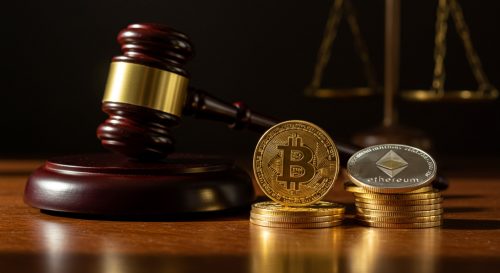How Are Cryptocurrencies Treated in Asset Restraint and Confiscation?

How Are Cryptocurrencies Treated in Asset Restraint and Confiscation?
Cryptocurrencies, such as Bitcoin and Ethereum, have gained significant attention in recent years for their potential as alternative digital currencies. However, their unique nature raises questions about how they are treated in asset restraint and confiscation scenarios. This article aims to provide an overview of the treatment of cryptocurrencies in asset restraint and confiscation cases.
Starting with an overview of cryptocurrencies, including their definition and function, this article will delve into the concept of asset restraint and confiscation. Asset restraint involves the temporary freezing of assets to prevent their disposal or movement, while asset confiscation refers to the permanent seizure of assets by authorities.
The treatment of cryptocurrencies in asset restraint will be explored, addressing whether cryptocurrencies are considered assets and the challenges they pose for asset restraint. it will cover the methods through which cryptocurrencies can be frozen or seized.
Next, the article will discuss the treatment of cryptocurrencies in asset confiscation, including the process of confiscation and what happens to confiscated cryptocurrencies.
Legal and jurisdictional considerations will also be examined, exploring whether cryptocurrencies are regulated in the context of asset restraint and confiscation, and whether different jurisdictions have varying approaches to cryptocurrencies in these situations.
To provide a comprehensive understanding, the article will present case studies and examples of notable cryptocurrency restraint and confiscation cases, highlighting lessons learned from these past incidents.
By exploring these topics, readers will gain insight into how cryptocurrencies are treated in asset restraint and confiscation scenarios, allowing them to navigate the legal landscape and understand the implications of owning or dealing with cryptocurrencies in such situations.
Overview of Cryptocurrencies

Cryptocurrencies have gained significant popularity in recent years. They are digital or virtual currencies that use cryptography for secure transactions and control the creation of new units.
These decentralised systems operate on blockchain technology, which ensures transparency and immutability. Bitcoin, Ethereum, and Litecoin are some of the well-known cryptocurrencies.
They offer benefits like fast and borderless transactions, lower fees, and increased privacy. It is essential to note that cryptocurrencies can be volatile, and their value can fluctuate dramatically. Understanding the basics of cryptocurrencies is crucial before investing or engaging in transactions.
Asset Restraint and Confiscation
- Temporary freezing of assets pending an investigation or trial.
- Used to preserve assets and prevent their dissipation or disposal.
- Can be imposed at any stage of a criminal investigation or legal proceedings.
- Can be applied to various types of assets, including bank accounts, real estate, vehicles, and cryptocurrency.
- May require approval from a court or a legal authority.
What is Asset Restraint?
Asset restraint refers to the legal process of limiting or restricting access to an individual or organisation’s assets. It is enacted to preserve and safeguard those assets, often during an ongoing investigation or legal proceedings.
In the context of cryptocurrencies, asset restraint involves freezing or securing digital assets to prevent them from being transferred or used. Cryptocurrencies are increasingly being recognised as assets and subject to asset restraint measures.
This is due to their growing popularity and the potential for illicit activities facilitated by digital currencies. Understanding asset restraint is crucial in the broader discussion of how cryptocurrencies are treated in legal and regulatory frameworks.
What is Asset Confiscation?
Asset confiscation refers to the legal process of seizing and taking control of assets that have been obtained illegally or are involved in criminal activities.
It is a method used by law enforcement agencies and governments to ensure that criminals are deprived of the proceeds of their illegal activities. This process involves the removal and forfeiture of assets from the control of the owner and their transfer to the state.
Asset confiscation plays a crucial role in combating organised crime and acts as a deterrent for individuals involved in illicit activities.
Treatment of Cryptocurrencies in Asset Restraint

When it comes to asset restraint, the treatment of cryptocurrencies in asset restraint differs from traditional assets. Here are some key points to consider regarding the treatment of cryptocurrencies in asset restraint:
- Identification: Cryptocurrencies need to be identified and traced to ensure they are included in asset restraint.
- Digital Wallets: Investigators must locate and gain access to the digital wallets where the cryptocurrencies are stored in order to properly treat them in asset restraint.
- Confiscation: Once identified, cryptocurrencies can be frozen or confiscated as part of the asset restraint process.
- Legal Framework: Jurisdictions vary in their treatment of cryptocurrencies in asset restraint, with some countries having specific legislation in place.
It is crucial for law enforcement agencies to stay updated on the evolving landscape of cryptocurrencies to effectively combat financial crimes and properly address the treatment of cryptocurrencies in asset restraint.
Are Cryptocurrencies Considered Assets?
Yes, are cryptocurrencies considered assets? Absolutely. They hold value and can be easily bought, sold, and utilised as a medium of exchange. However, the classification of cryptocurrencies can differ depending on the jurisdiction in question.
In certain countries, they are regarded as property or commodities, while in others, they may fall under the category of securities. This distinction significantly impacts the legal and regulatory frameworks surrounding their ownership, taxation, and treatment in asset restraint and confiscation instances.
To successfully navigate the legal landscape and ensure compliance while dealing with these digital assets, it is vital to comprehend the specific categorisation of cryptocurrencies in your jurisdiction.
What Challenges Does Cryptocurrency Pose in Asset Restraint?
The challenges that cryptocurrency poses in asset restraint include its decentralised nature, anonymity, and potential for cross-border transactions.
Due to its decentralised nature, it can be difficult for authorities to track and seize cryptocurrencies held in digital wallets. The anonymity provided by cryptocurrencies can make it challenging to identify the owners of these assets.
Additionally, the ability to conduct cross-border transactions with cryptocurrencies makes it harder for authorities to enforce asset restraint measures globally. Therefore, regulatory frameworks and international cooperation are necessary to effectively address the use of cryptocurrencies in asset restraint cases.
How Can Cryptocurrencies be Frozen or Seized?
Cryptocurrencies can be frozen or seized through various methods depending on the circumstances. One of the methods utilised is court-ordered asset restraints, where a court can issue an order to freeze or block access to cryptocurrency wallets or exchanges associated with criminal activities.
Another approach involves law enforcement agencies obtaining search and seizure warrants to confiscate digital devices containing cryptocurrencies. International cooperation and coordination among law enforcement agencies can also come into play when it comes to freezing or seizing cryptocurrencies held in different jurisdictions.
These measures are implemented to prevent the illicit use of cryptocurrencies and ensure compliance with legal and regulatory requirements.
Treatment of Cryptocurrencies in Asset Confiscation

Confiscated cryptocurrencies are handled differently in various jurisdictions. Here is a summary of how the treatment of cryptocurrencies in asset confiscation varies in different countries:
1. United States: Cryptocurrencies are considered property subject to seizure and forfeiture during investigations or court proceedings.
2. United Kingdom: The treatment of cryptocurrencies in asset confiscation falls under the Proceeds of Crime Act 2002. However, the POCA is complex due to the anonymity of cryptocurrency transactions.
3. Germany: Law enforcement agencies have the authority to seize cryptocurrencies, but only if they can establish a connection to criminal activity.
4. Japan: Cryptocurrencies can be confiscated if they are found to be linked to illegal activities. The government also possesses the power to sell the seized assets in auctions.
5. Australia: The treatment of cryptocurrencies in asset confiscation is similar to other assets. However, due to the unique nature of cryptocurrencies, the process is still evolving.
Please note that the treatment of cryptocurrencies in asset confiscation can vary by jurisdiction and is subject to changes in laws and regulations.
How Are Cryptocurrencies Confiscated?
Cryptocurrencies can be confiscated through various methods, such as legal actions and law enforcement procedures. So, how are cryptocurrencies confiscated? Well, when law enforcement agencies identify individuals engaged in illegal activities, they have the power to obtain court orders, allowing them to freeze or seize the cryptocurrency holdings of these individuals.
To do this, they freeze the associated wallets or accounts and transfer the funds into a controlled account. Once confiscated, these cryptocurrencies are typically held in secure wallets or custodial services until they are sold or liquidated using legal processes.
The proceeds from the sale are frequently used to compensate victims or support law enforcement efforts. Overall, the confiscation of cryptocurrencies requires a collaborative effort between legal authorities, technologists, and financial experts.
What Happens to Confiscated Cryptocurrencies?
When cryptocurrencies are confiscated, what happens to them? They go through a legal process that determines their fate. In some cases, the government may choose to sell off the seized cryptocurrencies through auctions or exchanges.
These sales often generate proceeds that are used to compensate victims or fund law enforcement activities. However, the specific outcome of confiscated cryptocurrencies can vary depending on the jurisdiction and the nature of the case.
It is important to note that in addition to being sold, confiscated cryptocurrencies can also be retained for investigative purposes or returned to their rightful owners if they can be identified.
Legal and Jurisdictional Considerations
Legal and jurisdictional considerations play a vital role in the treatment of cryptocurrencies in asset restraint and confiscation cases. These considerations are crucial for governments and law enforcement agencies to effectively handle such cases.
Key factors that need to be taken into account include the country’s regulatory framework, its position on cryptocurrencies, as well as the specific laws regarding seizure and forfeiture. To simplify the understanding of these factors, the table below highlights some important aspects:
| Legal Considerations | Jurisdictional Considerations |
|---|---|
| Licensing requirements | Country-specific regulations |
| Anti-money laundering laws | International cooperation |
| Taxation policies | Extradition treaties |
| Privacy and data protection | Cross-border legal procedures |
It is essential to understand and adhere to these legal and jurisdictional considerations in order to effectively address cryptocurrency-related asset restraint and confiscation.
Are Cryptocurrencies Regulated in Asset Restraint and Confiscation?
Yes, cryptocurrencies are indeed regulated in terms of asset restraint and confiscation. Governments and regulatory bodies across different jurisdictions have recognised the importance of addressing cryptocurrencies in this context.
They have implemented specific legislation or guidelines to govern how cryptocurrencies should be treated in these situations. The main objective of these regulations is to ensure transparency, prevent money laundering, and facilitate the recovery of assets.
However, due to the decentralised nature of cryptocurrencies and the challenges they present, enforcing these regulations in asset restraint and confiscation can be a complex task. Therefore, legal frameworks are continuously evolving to adapt to the unique characteristics of cryptocurrencies.
Do Different Jurisdictions Have Different Approaches to Cryptocurrencies?
In the realm of cryptocurrencies, it is evident that different jurisdictions exhibit diverse approaches. This disparity arises primarily from their varying regulatory frameworks and attitudes towards these digital assets.
Case Studies and Examples

From notable cases of cryptocurrency restraint and confiscation to lessons learned from past incidents, this section presents intriguing case studies and examples. Explore real-life scenarios where cryptocurrencies were involved in legal battles and discover valuable insights gleaned from these experiences.
Find out how the treatment of cryptocurrencies in asset restraint and confiscation has unfolded in practice, backed by facts and supported by tangible examples.
Notable Cases of Cryptocurrency Restraint and Confiscation
- The Silk Road: This is one of the most notable cases involving the online black market. In this case, authorities seized over 144,000 bitcoins from the founder, resulting in a high-profile trial.
- MT. Gox: Another significant case is MT. Gox, which was the largest bitcoin exchange at the time. In 2014, it filed for bankruptcy after losing approximately 850,000 bitcoins, leading to an ongoing legal battle.
- AlphaBay: Law enforcement shut down AlphaBay, a dark web marketplace, which resulted in the seizure of millions of dollars worth of cryptocurrencies.
- OneCoin: This is one of the largest cryptocurrency Ponzi schemes. Authorities seized billions of dollars in assets, including cryptocurrencies.
- Silk Road 2.0: Silk Road 2.0 was a second iteration of the infamous Silk Road. It was taken down, and over 144,000 bitcoins were seized as a result.
Lessons Learned from Past Cases
Lessons learned from past cases of cryptocurrency restraint and confiscation provide valuable insights for legal and regulatory frameworks. These insights can help improve the future handling of cryptocurrencies in asset restraint and confiscation, by understanding the challenges faced and the approaches taken.
Frequently Asked Questions
How are cryptocurrencies treated in asset restraint and confiscation?
Cryptocurrencies, such as Bitcoin and NFTs, are considered property under UK law, the Criminal Code in Australia, and in the United States. They can be seized, confiscated, ring-fenced, or frozen as part of criminal investigations and enforcement actions.
What triggers the investigation and restraint of cryptocurrency assets?
Investigators become aware of potential criminal activity involving cryptocurrencies through various means, including complaints, suspicious activity reports from banks, and data collection by government agencies, such as HMRC. These reports and data assist in initiating investigations and can lead to the restraint of cryptocurrency assets.
How are cryptocurrency accounts frozen during investigations?
When an investigation is initiated, a person or company may find their cryptocurrency account(s) frozen by their crypto exchange or through a court order. Banks may also freeze associated fiat currency accounts. Internal investigations by the bank may result in the account being unfrozen if no proceeds of crime are found, but remaining suspicions are usually escalated to law enforcement.
Can cryptocurrency assets be recovered from illicit activity?
Yes, there are processes in place for the recovery of cryptocurrency assets obtained through illicit activity. Specialist recovery experts can trace the movement of funds through the blockchain to identify and recover stolen assets. Crypto exchanges may also be obligated to assist in the recovery of funds or provide information about fraudulent activity.
Which countries have been successful in confiscating crypto assets?
Countries such as the United States, the United Kingdom, Australia, Belgium, France, and other EU member states have successfully confiscated and auctioned off crypto assets. However, some countries, particularly in Africa, have not yet seized or recovered any crypto assets.
Is there any legal barrier to recovering illicit crypto assets?
No, there are no legal barriers to recovering illicit assets held in crypto formats. Any country with asset recovery legislation and systems in place can recover crypto assets. The existing legislative regimes and common law concepts are applicable to cryptocurrency and can be leveraged for asset recovery purposes.
Notice: Informational Content Disclaimer
The content provided on this website, including articles, blog posts, and other informational materials, is intended for general informational purposes only. It is not intended as, and should not be considered, legal advice.
Visitors to this website should be aware that the information presented here is not a substitute for seeking legal advice from a qualified solicitor or legal professional. Each individual's legal situation is unique, and the information provided may not be applicable to specific circumstances.
If you require legal advice or have specific legal questions, we encourage you to contact us directly. Our experienced team of solicitors is here to assist you with your legal needs and provide tailored advice to address your concerns.
Please be advised that any communication through this website, including the use of contact forms or email, does not create a solicitor-client relationship. Confidential or time-sensitive information should not be sent through this website. To establish a solicitor-client relationship and discuss your legal matters in detail, please contact us for a consultation.
We strive to provide accurate and up-to-date information, but we make no representations or warranties regarding the accuracy, completeness, or suitability of the information contained on this website. We shall not be liable for any reliance placed on the information provided herein.
Thank you for visiting our website. We look forward to the opportunity to assist you with your legal needs.




